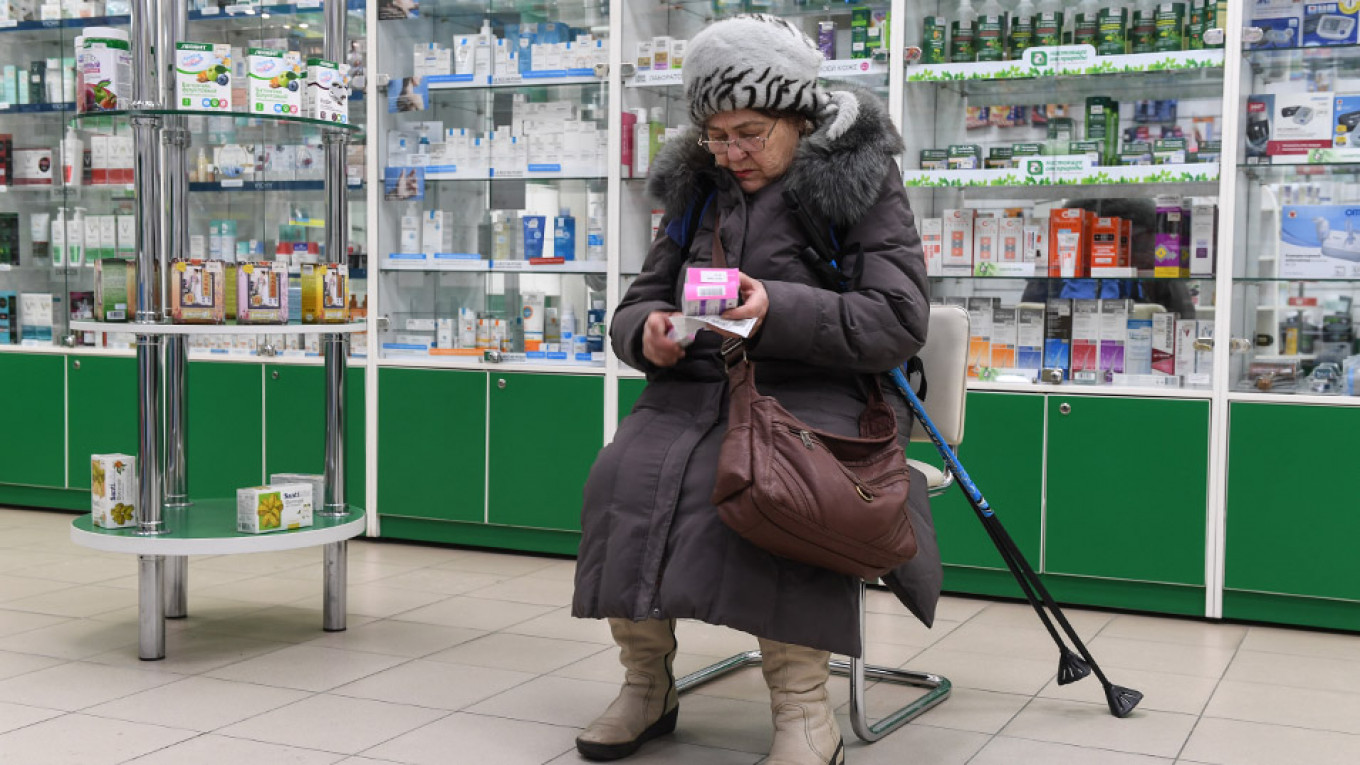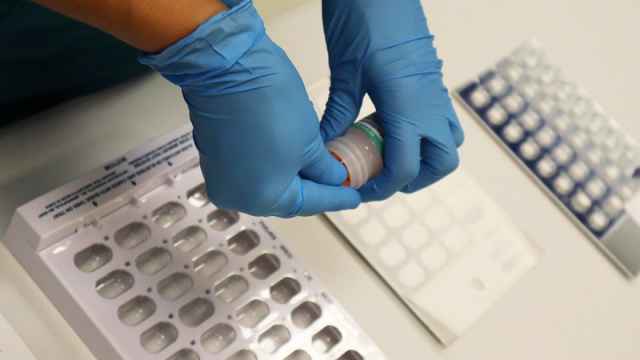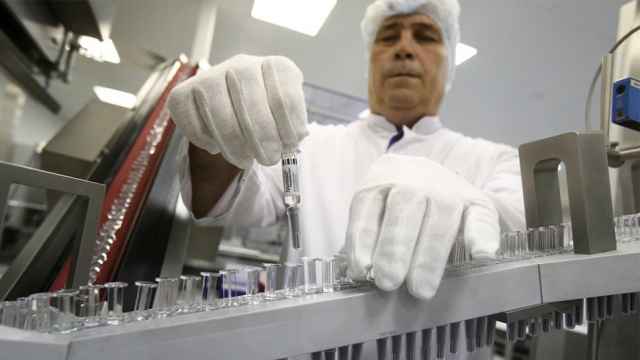It was late November in St. Petersburg, and, like many residents of the frigid northern city as winter set in, Taisiya Sheremet caught a cold.
But for the 17-year-old cystic fibrosis patient, common colds don’t get better in a few days. Because the disease primarily affects the respiratory system, a sniffle can lead to a lung infection. Soon, Sheremet’s body temperature had soared and she had lost more than 10% of her body weight.
Her usual strong antibiotic, Fortum, produced by the British pharmaceutical company GlaxoSmithKline (GSK), however, had vanished from the Russian market earlier in 2019. It was only through her role as an Instagram influencer with nearly 60,000 followers that she managed to get a course of the medication from Germany.
“Without it I would have died,” Sheremet told The Moscow Times. “Because of Instagram, I was able to get the medicine in three days. But what about everyone else?”
In 2019, a slew of imported medicines disappeared from Russian pharmacies. Doctors treating diseases ranging from diabetes to HIV to blood cancers have sounded the alarm from within a struggling healthcare system plagued by outdated facilities, a lack of funding and low wages.
While changes in Big Pharma policy can cause a shortage of a specific drug in any country, Russia is a specific case because it has compounded the problem by implementing policies aimed at promoting domestic businesses and cutting spending.
The first of these policies, signed into law in 2013, regulates the Russian government’s purchases of goods including software, construction materials and medical equipment. It contains a key stipulation: If two Russian companies are bidding for a government tender, foreign bidders are excluded from the auction.
At the time the law was passed, Alexei Maschan, director of the Dmitry Rogachev National Research Center of Pediatric Hematology, Oncology and Immunology, called it a “nasty trick” played on doctors and their patients.
Foreseeing a shortage of foreign medicines as a consequence of the policy, Maschan’s clinic stockpiled medication. Nonetheless, he now says, as the policy has begun to take effect, they are beginning to run low.
“The problem is that these protectionist measures have limited Western companies’ access to the market that worked here for decades and whose drugs worked,” Maschan told The Moscow Times recently. “Not only does this policy lower competitiveness, resulting in lower quality, but our producers currently aren’t able to supply the right quantity of the medicines anyway.”
Intensifying the effects of the import substitution policy, the Health Ministry at the beginning of 2019 passed a policy that set prices on government tenders at a minimum rate. According to a study by the Moscow-based Headway Group, which monitors tenders, nearly 30% of medicine purchases fell through over the first half of last year.
One representative of a Western pharmaceutical company that pulled its medication from the market spoke candidly about the decision on the condition they would not be named. They said that selling a drug on a foreign market has high costs and that lower prices have made it harder to justify selling in Russia.
“Think of regulations like the weather,” the representative said. “I think we can all agree that the weather is not particularly good in Russia.”
As medications disappear, patients who can afford to have tried to source what they need from abroad. But this can also bring trouble. In August, one mother was arrested for smuggling a foreign drug for her son’s epilepsy that was no longer registered in Russia. After an uproar, she was released, and then-Prime Minister Dmitry Medvedev ordered that the drug be made accessible.
Experts, however, say that piecemeal measures only paper over the structural causes — and that even in the decisions made on a case-by-case basis, they’re not always solved efficiently.
In late December, the Health Ministry organized a meeting with stakeholders to try to find a solution for the lack of Fortum. Weeks later, according to Irina Dmitriyeva, who runs Na Odnom Dykhanii — In One Breath — a non-profit organization dedicated to helping cystic fibrosis patients, those affected are still waiting for an answer. That’s despite GSK saying it is ready to deliver a supply of the drug to cover demand, at least in the short-term.
In his state-of-the-nation address last month, President Vladimir Putin called on his government to resolve the issue, though he didn’t offer specifics. “These kinds of situations can never happen again,” he said.
For a disease like cystic fibrosis, time is of the essence, as the average lifespan for patients in Russia is 25. Since the beginning of 2020, six young patients that she knows of that she knows of have already died, Dmitriyeva said.
“This is absolutely atypical,” she said, noting that her organization tracks some 4,000 patients around the country. “It’s clearly a consequence of what they are being treated with.”
“People could lose their lives because of political decisions,” she added.
Asking to remain anonymous, a high-ranking person at GSK close to the discussions surrounding the Fortum controversy said that after parents of cystic fibrosis patients raised a commotion, the company consulted specialists about Russian generics of the medicine. The experts said that Fortum is the only drug that works for a certain group of patients, the person said.
Russian generics not being up to the task is what 33-year-old Uliana Dotsenko believes killed her three-month-old son Dima, a cystic fibrosis patient, in June 2018.
When he was born that March, Dima was immediately diagnosed and treated at Moscow’s Filatovskaya Children’s Hospital, where his doctor prescribed foreign medications, and typed, in bold, underlined font: “IT IS VITALLY IMPORTANT THAT THE DRUGS NOT BE REPLACED!”
Two months later Dima was home healthy, but he soon came down with the lung infection common to cystic fibrosis patients. An ambulance took him to a different clinic at Moscow’s Morozovskiy Children’s Hospital, where doctors gave him Russian generics, despite Dotsenko having shown them the earlier prescription.
Dima died a few weeks later. While the case is still in the hands of the Investigative Committee, Dotsenko plans to sue the hospital if investigators do not bring a case to prosecutors themselves.
“It was made clear to them that generics wouldn’t do,” Dotsenko said. “To put it bluntly, they killed my child.”
A Message from The Moscow Times:
Dear readers,
We are facing unprecedented challenges. Russia's Prosecutor General's Office has designated The Moscow Times as an "undesirable" organization, criminalizing our work and putting our staff at risk of prosecution. This follows our earlier unjust labeling as a "foreign agent."
These actions are direct attempts to silence independent journalism in Russia. The authorities claim our work "discredits the decisions of the Russian leadership." We see things differently: we strive to provide accurate, unbiased reporting on Russia.
We, the journalists of The Moscow Times, refuse to be silenced. But to continue our work, we need your help.
Your support, no matter how small, makes a world of difference. If you can, please support us monthly starting from just $2. It's quick to set up, and every contribution makes a significant impact.
By supporting The Moscow Times, you're defending open, independent journalism in the face of repression. Thank you for standing with us.
Remind me later.







